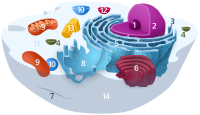
Photo from wikipedia
In ribosomal polypeptide synthesis, the 61 sense codons redundantly code for the 20 proteinogenic amino acids. The genetic code contains eight family codon boxes consisting of synonymous codons that redundantly… Click to show full abstract
In ribosomal polypeptide synthesis, the 61 sense codons redundantly code for the 20 proteinogenic amino acids. The genetic code contains eight family codon boxes consisting of synonymous codons that redundantly code for the same amino acid. Here, we describe the protocol of a recently published method to artificially divide such family codon boxes and encode multiple nonproteinogenic amino acids in addition to the 20 proteinogenic ones in a reprogrammed genetic code. To achieve this, an in vitro translation system reconstituted with 32 in vitro transcribed tRNASNN's (S = C or G; N = U, C, A or G) was first developed, where the 32 tRNA transcripts can be charged with 20 proteinogenic amino acids by aminoacyl-tRNA synthetases in situ and orthogonally decode the corresponding 31 NNS sense codons as well as the AUG initiation codon. When some redundant tRNAGNN's are replaced with tRNAGNN's precharged with nonproteinogenic amino acids by means of flexizymes, the nonproteinogenic and proteinogenic aminoacyl-tRNAs can decode the NNC and NNG codons in the same family codon box independently. In this protocol, we describe expression of model peptides, including a macrocyclic peptide containing three kinds of N-methyl-amino acids reassigned to the vacant codons generated by the method of artificial division of codon boxes.
Journal Title: Methods in molecular biology
Year Published: 2018
Link to full text (if available)
Share on Social Media: Sign Up to like & get
recommendations!